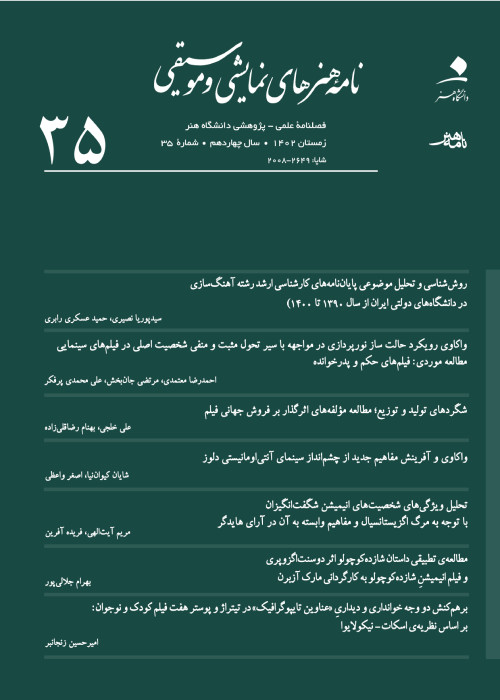Pastiche, Postmodernism, and Commercial Cinema Case study: King Kong movie series (1933, 1976, 2005, and 2017)
Author(s):
Article Type:
Research/Original Article (دارای رتبه معتبر)
Abstract:
One of the postmodernism phenomena in a cultural realm is the appearance and proliferation of Pastiche. The investigation of the meaning and features of pastiche has nowadays become a major field of study in postmodernism. In cultural studies, pastiche has generally been studied in parallel with the definition of parody. From some perspectives, pastiche is derived from parody, but it conducts different features than it. Both of them employ the deconstruction of texts and benefit from their process and results which should be playful. They imitate from culture instead of nature although the mode is dramatically different. Most parodies establish irony to challenge ideas and attempt to prohibit of accomplishment of ideological systems of the ideas. Pastiche without irony and a challenging approach imitate and combine the elements of texts. The change of cultural logic provides the special condition for vast dominant usage of pastiche among most of the recent cultural products, including commercial cinema. There are different investigations about the causes and the results of pastiche, and as a result, some antithetical approaches to the definition of pastiche have been established by sociologists, philosophers, and artists. Among the similarities and differences in theories, some important questions have been raised to the mind; what are the major features of pastiche, and how much do they differentiate pastiche from its modernism roots, parody. How does Pastiche benefits from cultural logic’s changes in the postmodern era, and whether it, like parody, puts obstacles in the way of the conduction of the ideology of texts? To respond to these questions, at first, we attempted to define the meaning of pastiche via the juxtaposition of the antithetical theories and find the problems. Then, a comprehensive conclusion about the definition of pastiche could help us to accomplish a deductive method for examination of the results in a case study which was selected from commercial cinema. The method of gathering data is a bibliography. The case study belongs to popular cinema which could depict three eras of cinema: Classic, modern and postmodern cinema. We can observe cultural reproduction and the historical tendency among four issues of King Kong, including the issues of 1933, 1976, 2005, and 2017. Pastiche extends itself among the issues 2005 and 2017 strongly. The issue 1933 is a classic film which imitates the real world, but in later issues, previous texts become the origins for imitation by pastiche and even kitsch. According to Fredric Jameson’s theory, in the postmodern era, cultural logic has been changed and intensifies consumer culture, reducing the meaningfulness. The culture has been industrialized and produces cultural commodities. It makes satisfaction for the masses via pastiche which employs nostalgia by recalling different specific cultural memories or historical moments. As a consequence, the lack of referring to nature and self-referring of texts leads to aggregating the emptiness of context in the texts. Contrary to parody’s prohibition of the establishment of an idea via deconstructionism, pastiche conducts its specific ideological regime, until consumes what it produces, and then pastiche reproduces it continuously.
Keywords:
Language:
Persian
Published:
Journal of dramatic Arts and Music, Volume:12 Issue: 24, 2022
Pages:
65 to 81
magiran.com/p2427543
دانلود و مطالعه متن این مقاله با یکی از روشهای زیر امکان پذیر است:
اشتراک شخصی
با عضویت و پرداخت آنلاین حق اشتراک یکساله به مبلغ 1,390,000ريال میتوانید 70 عنوان مطلب دانلود کنید!
اشتراک سازمانی
به کتابخانه دانشگاه یا محل کار خود پیشنهاد کنید تا اشتراک سازمانی این پایگاه را برای دسترسی نامحدود همه کاربران به متن مطالب تهیه نمایند!
توجه!
- حق عضویت دریافتی صرف حمایت از نشریات عضو و نگهداری، تکمیل و توسعه مگیران میشود.
- پرداخت حق اشتراک و دانلود مقالات اجازه بازنشر آن در سایر رسانههای چاپی و دیجیتال را به کاربر نمیدهد.
In order to view content subscription is required
Personal subscription
Subscribe magiran.com for 70 € euros via PayPal and download 70 articles during a year.
Organization subscription
Please contact us to subscribe your university or library for unlimited access!


